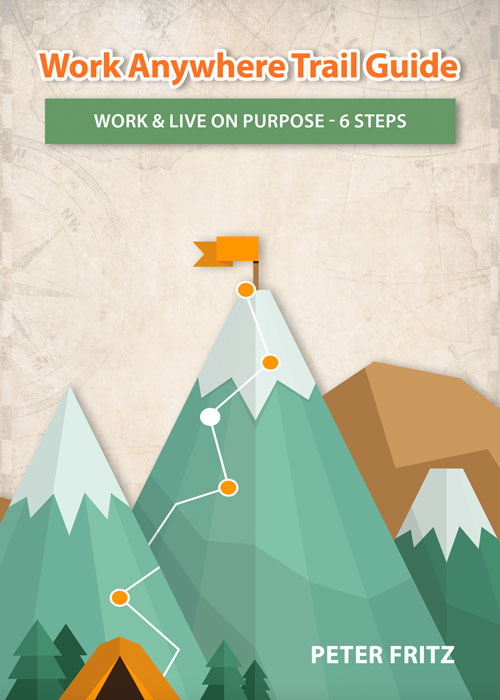Standing at an open fridge and trying not to eat is like having Gal Gadot and Tom Hardy walking around your house in their underwear and trying not to look.
Working from home is the same. It’s brilliant, but not without challenges.
Strangely, I only seem to have one, and that’s knowing when to stop for the day. I don’t know if it’s my work ethic or the fact that I enjoy what I do, but working too many hours is my only challenge. Aside from that, working from home (or a park bench by a lake) is perfect for me, with no other downsides to speak of.
The thing is, though, we’re all different, and what might be a non-issue for me might be a deal-breaker for you. Someone recently suggested (thanks Lee) that legitimate hurdles really do exist for remote workers, and that I should probably talk about them. After all, a problem identified is a problem half solved.
Lee’s right, of course, so I decided to get right on it and look at a few of the big ones. Bear in mind, this topic is too big for a single post, so this is little more than a dance around the edges. Stay tuned for a more expansive look at each in the future. For now, though, these are what I’d consider the top five challenges of working from home.
1. Lack of Structure and the Chance to Procrastinate
My dad worked like a dog for more than 50 years. It was physically and mentally challenging and it tested his limits many times – twice to breaking point. Yet despite the hardship, once he retired, he felt lost. It took him years to stop dreaming about work, to stop anticipating calls from clients, and to accept that his time was now his own.
Fifteen years later, he’s at peace, and he enjoys a rich and healthy life filled with travel and adventure.
Remote workers can feel a bit lost, too – especially if, like most of us, they bought into the structure of corporate life. Being told what to do, where to do it and when to do it can be demoralising, but at least it excuses us from having to think.
Working from home disrupts structure, which can lead to procrastination. When you’re looking at dirty windows, a dishwasher that needs emptying and a floor covered in kids’ toys, you might want to tackle those instead of your work. By the way, when I say ‘you’, I really mean you, because this is a problem I don’t have.
When I began working from home, I treated it like my boss had a bunch of hidden cameras in the house – so if I slacked off, he’d know about it. If I spent an hour on the toilet thumbing through my phone, he’d haul me into the office for a ‘please explain’. These days, I behave like I’m the boss (which we all are in a way), and the fact is, I don’t want to let myself down. I can act like I’m busy or productive all I want, but if I’m not, I’ll know. Tom Bilyeu – founder of Quest Nutrition and Impact Theory – says our sense of happiness and success comes down to what we say about ourselves when we’re by ourselves.
If you suffer from procrastination or you fear a lack of structure, you need to take ownership of your role and create that structure for yourself. You need to plan your days in advance, set a schedule and then work like the boss is watching you from the corner of the room.
Better yet, recognise that no matter who you work for, you are ‘You Incorporated’. You are ultimately answerable to that person staring back at you in the mirror, and she’ll know if you did a good job today or not.
2. Collaboration
Mixing with like-minded people can be a lot of fun – creating a special kind of energy that’s impossible to get on your own. Some of the most invigorating projects I’ve worked on have been with people I respect and admire; people with enthusiasm, creativity and big ideas. And despite being a solo creator, I plan to do a lot more collaborative work in the future because it’s so damn satisfying.
This points to what could be a problem for remote workers. If you’re alone in your home office, how do you engage with your colleagues, clients and other stakeholders? Ten years ago, the only way was to get in a room with them. Today, the options are plentiful. There’s GoToMeeting, Skype, Facebook Workplace, Zoom, Basecamp, Slack and dozens of others. It’s actually easier to connect today because it doesn’t matter where your team is anymore. No one has to board a plane, get in a car or find a parking spot close to the office. All we need is a device and some Internet.
And don’t forget the good old phone, either. I generally find if an issue isn’t resolved with two emails, a phone call will clear things up. Plus, it’s sometimes nice to have a yak. And if you want to show off the tan you got over the weekend, there’s always FaceTime, Facebook Messenger, Google Hangouts or Skype.
On the rare occasion I visit colleagues in our city office or meet with a client at a local cafe, it’s usually a fun experience. But efficient it certainly isn’t. Most interactions can be just as effective with a simple piece of software or an email, backed with a phone call.
3. Temptation
This is a simple one. If you’re tempted to do the wrong thing when no one’s watching, you’ll do the wrong thing anywhere. Plenty of people look busy at the office but don’t do sh*t. They’re slackers and arse-kissers who’ll only do enough not to get fired, or noticed. I’m hoping you’re not one of those people because if you are, this arrangement won’t last long.
Understand, you’re not twelve anymore. Working remotely is a responsibility and a privilege. You don’t have the luxury of looking busy while secretly stalking your ex on Facebook. You actually need to produce something. Not occasionally, but every week.
Do your work. Do your best work because it matters to you. Not because the company expects it, but because you expect it. Approached this way, working from home is exciting, and it marks you out as a person others trust to deliver on time every time. That’s a credential you take to the bank no matter where you go.
4. Loneliness
Maybe I’m strange, but I’ve never felt lonely working on my own. As I mentioned, I enjoy my own company and rarely feel the need for others outside my immediate family. My circle of friends is deliberately small and I’m super picky about who I spend time with – personally and professionally.
Most people who know me might find this surprising because I can be extremely social and engaging in a group. I have a habit of gutting the formality from meetings and getting everyone in the room to behave like the humans they are. Humans who fart, snore and look ugly when they get out of the shower.
I’m dancing around the topic, I know, but I don’t have much to offer you than this. If you’re lonely, maybe you’re not focused on the work. Or maybe you need to pick up the phone more often instead of doing everything by email or Slack. Maybe you just need to grab a spot at your local cafe or even a coworking space from time to time. Maybe the white noise and visual stimuli are all you need to remind yourself your not alone in the world. If you live alone, this approach might become your go-to strategy to beat the isolation.
Here’s another tip. Providing you’re not writing or reading, a selection of podcasts might be a good fit for you. I’m a huge fan of Seth Godin’s Akimbo, and I’ve also listened to the late Alan Watts, James Altucher, Bedros Keuilian and Tim Ferriss.
If you have a peer level colleague or friend you trust, you might schedule a call every couple of days to catch up on each others’ projects.
I’ll admit I’m a bit cavalier about this because I’ve never lived alone for more than a few months. I know loneliness is real, though, and I certainly felt it when I was doing 20-hour stints years ago. Granted, that was self-imposed isolation. But the only way to tackle it is to focus on doing great work, and then punctuating that with some human interaction – digitally or face-to-face.
5. Being Forgotten
While this might seem like a legitimate fear, it’s also obsolete – a hangover from the industrial revolution we all ingested at school. Many of us (and our bosses) continue to promulgate the idea that we need to be visible to be valued.
Some of today’s smartest and fastest-growing companies use a remote workforce – some exclusively. They measure staff performance on outcomes, not attendance. To think you must smile at your boss five times a day to be considered for a promotion is archaic and simple-minded.
Having said that, until those further up the chain get it, I recommend staying in touch at least as often as you would if you were office-bound. Track your projects with a tool like Basecamp and keep your colleagues in the loop with regular progress updates. Get on the phone with your boss from time to time and consider giving her a weekly WIP report.
Working remotely gives you freedom and autonomy, but you must pay for those with accountability and transparency.
If recognition and rewards are important to you, show your boss you deserve them – not through arse-kissing, but results.
Is it worth it?
Some of you will question the value – and perceived risk – of working from home, which is stunning to me. I’ve done it for 20 years and I’d never go back to corporate life. So my answer to the question, “Is it worth it?” is an absolute yes! Here’s a VERY short list explaining why:
- No commuting saves me two hours a day. That’s 60 eight-hour working days a year! Sixty days!
- I walk my son to and from school every day. This alone is priceless.
- I work where I’m most productive and creative – not a cubicle surrounded my miserable faces.
- I have FREE TIME to pursue side hustles like this blog, to hang out with my family and enjoy life.
- I don’t squeeze life into the cracks of my work. My work fits around my life.
The bottom line is, I value the things on this list more than a promotion, more than a fancy title and more than a tonne of money. With my extra 60 workdays each year, I can give myself a promotion, create my own title and make money on my terms.
I’ve said it a thousand times and I’ll keep on saying it. It doesn’t matter how much you’re getting paid; if you hate where you work or the way you work, you’re wasting the one life you’re ever going to have. Look at my little list above and try to convince me it doesn’t sound attractive.
Anyway, you probably have a stack of TPS reports to deal with, so I’ll end this here. Matter of fact, I have a few things to do myself. If I could just stop thinking about Gal Gadot’s lingerie scene in Keeping Up with the Joneses, I might also get some of them done.
Peter
.
[ss_click_to_tweet tweet=”Working remotely gives you freedom and autonomy, but you must pay for those with accountability and transparency.” content=”Working remotely gives you freedom and autonomy, but you must pay for those with accountability and transparency.” style=”5″ link=”1″ via=”1″]
Related Stories
Work from home but keep your day job.
How do you convince your boss to let you work remotely?
5 Rules for Working from a Home Office
3 Habits Every Remote Worker Should Have
Remote workers are good for business – statistics prove it.
Working from home – my typical day as a remote worker.
Why I work from home, and why it might be right for you, too.
Recent Posts
An Audience of a Billion – How to Master Instagram with Tash & Viv of Ace the Gram
[fusebox_track_player url="http://traffic.libsyn.com/midlifetribe/Viv_and_Tash_-_Ace_the_Gram.mp3" background="#f2f2f2" social_linkedin="true" twitter_username="PeterFritz3" ]Recorded with SquadCast Subscribe: iTunes | Google Podcasts | Stitcher | Spotify | Player.FM...
This is the future, you have to go remote – Rob Rawson, CEO of Time Doctor
[fusebox_track_player url="http://traffic.libsyn.com/midlifetribe/Rob_Rawson_-_Founder_of_Time_Doctor.mp3" background="#f2f2f2" social_linkedin="true" twitter_username="PeterFritz3" ]Recorded with SquadCast Subscribe: iTunes | Google Podcasts | Stitcher | Spotify |...
Turn your Mess into your Message – Genecia Alluora Leads Asian Businesswomen
[fusebox_track_player url="http://traffic.libsyn.com/midlifetribe/Genecia_Alluora_-_Soul_Rich_Woman.mp3" background="#f2f2f2" social_linkedin="true" twitter_username="PeterFritz3" ]Recorded with SquadCast Subscribe: iTunes | Google Podcasts | Stitcher | Spotify |...
Why voice messaging beats Slack & Zoom – with Yac CEO, Justin Mitchell
[fusebox_track_player url="http://traffic.libsyn.com/midlifetribe/Justin_Mitchell_-_YAC.mp3" background="#f2f2f2" social_linkedin="true" twitter_username="PeterFritz3" ]Recorded with SquadCast Subscribe: iTunes | Google Podcasts | Stitcher | Spotify | Player.FM...
Matt Barnett, and the best remote engagement tool in the world – Bonjoro.
[fusebox_track_player url="http://traffic.libsyn.com/midlifetribe/Bonjoro_-_Matt_Barnett_-_on_Remote_Customer_Engagement_100.mp3" background="#f2f2f2" social_linkedin="true" twitter_username="PeterFritz3" ]Recorded with SquadCast Subscribe: iTunes | Google Podcasts |...
How a pandemic is crushing old beliefs and our irrational fears of a better life.
[smart_track_player url="http://traffic.libsyn.com/midlifetribe/How_a_pandemic_is_crushing_old_beliefs_099.mp3" background="#f2f2f2" social_gplus="false" social_linkedin="true" social_email="true" ]We humans are ridiculous. Collectively, we've solved thousands of...
Download the Guide
Step 1: Work from home.
Step 2: Create a life.








